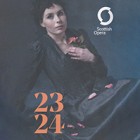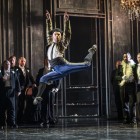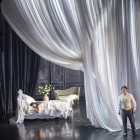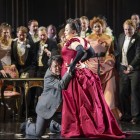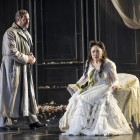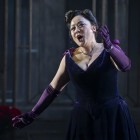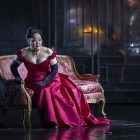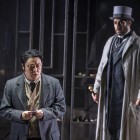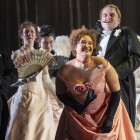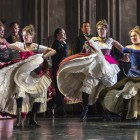Traviata 2024Scottish Opera
Read more about the opera Traviata
Sir David McVicar's 2008 production of La traviata opened in Glasgow and was revived in 2017. Its overall excellence meant that it has also been toured by Welsh National Opera and has been performed by the opera companies in Madrid and Barcelona.
This season's offering consists of fifteen performances spread over the four cities that have suitable theatres.
An innovation this year is that the middle Sunday of the Glasgow and Edinburgh visits has a 3pm matinee at 3pm, which should make travelling easier for those outwith the cities.
Furthermore on 17 May (Glasgow) and 14 June (Edinburgh) there are accessible performances at 3pm, when Inna Husieva, the cover for the run, will be Violetta. These sessions are reduced to two hours, including a thirty minute interval, and incorporate a narrator, enabling a relaxed atmosphere. These versions are adjusted primarily for people living with dementia or Long Covid. This timing also makes it suitable for anyone else who may find it difficult to attend evening performances.
The opening performance in Glasgow was greeted with huge delight by the packed audience. What must be mentioned first is the quite superb contribution of orchestra and chorus, immaculately controlled by Stuart Stratford. While he is known for the wide range of his repertoire, he is not thought of particularly as a Verdian. Yet Stratford has conducted Rigoletto and Forza at Holland Park, as well as a memorable Falstaff with Scottish Opera.
This Traviata was therefore something of a revelation. The calm of a conventional prelude was shattered by the blistering pace introduced with the start of the party. Seen very much from Violetta's viewpoint, this was taken at a feverish, near hysterical pace. Presented already as clearly unwell, and with a high temperature, she was also, unusually, cosseted by her maid, Annina, all too aware of her mistress's fragile state. This emphasis also explained, to some extent, the otherwise mysterious presence of her doctor at such an event. The chorus and orchestra were on wonderfully crisp form and yet there was also plenty of variation, with no sense of the straitjacket some less idiomatic conductors impose.
This 2008 production can now be described as venerable. With only one previous Scottish revival, in 2017 (though seen regularly in Wales and Spain), the company seems to have treated it almost as a new production, offering plenty of time for Leo Castaldi to rehearse the staging. Castaldi has assisted David McVicar on the Spanish runs of the production. It was good on this opening night to see Sir David take a bow with his colleagues.
Everything went like a well-oiled machine. The set is simple - a black slab floor, representing a tombstone, a wall across the back, with a couple of entry points. A curtain was used to screen off or emphasise as appropriate. The costumes are effective, atmospherically high-Victorian. Choreography remains strikingly effective, with its bullfight imagery.
What of the principals? Hye-Youn Lee is clearly now an established favourite with local audiences. Her acting is detailed and effectively moving. The role is notoriously difficult vocally, with a different approach requitred in each of the scenes. She coped magnificently.
Another Korean, the tenor Ji-Min Park, has appeared in this staging with WNO, as well as with Covent Garden, Opera North and elsewhere. He is a good actor and a slight tendency to sharpen up top settled down and will no doubt be fine at later performances. The New Zealand baritone Phillip Rhodes made an excellent Germont, emphasising the sense of shock when he finds the venom he has rehearsed for weeks to be completely misplaced.
The shorter roles in this opera can sometimes make the characters appear like ciphers, with little to distinguish the four men at the party. On this occasion each was clearly delineated in appearance and temperament. It really does pay dividends when they can be cast from strength. Nicholas Lester's Baron can easily dominate by height alone, but was not satisfied with that. Ross Cumming was an extrovert Marquis and Monwabisi Lindi made an unusually bright-toned Viscount.
Lea Shaw was an unusually full-toned Flora. The part is often cast with a light soprano, but this time the contrast with Violetta was highly effective. Heather Ireson's Annina also made an impact in every scene where she appeared - I don't remember her character sleeping on the floor in the final act before.
In all, this was a highly satisfying revival of a production which should continue to entertain us for a long time to come. It is clearly the best performance overall that the staging has enjoyed, and the screw will no doubt tighten even further as it tours the country.
Performance Cast
- Violetta Valéry a courtesan
- Baron Douphol Violetta's protector, a rival of Alfredo
- Doctor Grenvil
- Flora Bervoix Violetta's friend
- Marquis d' Obigny
- Gaston Vicomte de Letorières, a man about town
- Alfredo Germont Gaston's friend
- Annina Violetta's maid
- Giuseppe Violetta's servant
- Giorgio Germont Alfredo's father
- Commissar in Flora's household
- Servant in Flora's household
Production Cast
- Conductor
-
Stuart Stratford (Exc May 18; Jun 1)
Toby Hession (May 18; Jun 1)
- Director
- Designer - Sets
- Designer - Costumes
- Lighting
-
Robert B Dickson (Revival)
- Choreography
-
Sirena Tocco (Assistant)
- Associate Director
- Orchestra
- Co-producer
Performance DatesTraviata 2024
Theatre Royal, Glasgow | Glasgow
8 May, 19.15 10 May, 19.15 12 May, 15.00 14 May, 19.15 16 May, 19.15 18 May, 19.15
Eden Court Theatre | Inverness
23 May, 19.15 25 May, 19.15
His Majesty's Theatre, Aberdeen | Aberdeen
30 May, 19.15 1 Jun, 19.15
Festival Theatre, Edinburgh | Edinburgh
7 Jun, 19.15 9 Jun, 15.00 11 Jun, 19.15 13 Jun, 19.15 15 Jun, 19.15
